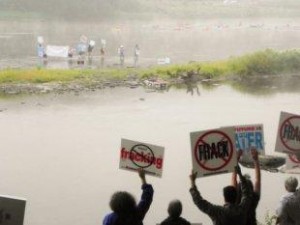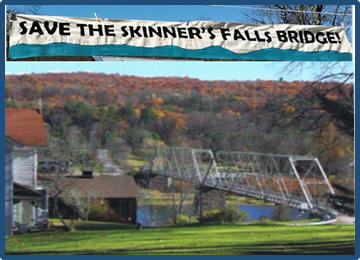Will Public Outcry Against Fracking Sink Governor Cuomo's Political Ambitions?
August 27, 2012Gas Production Dropping Like Rocks!
August 27, 2012By Nora Eisenberg, AlterNet, August 24, 2012

Photo Credit: Brandi Merolla
At just after 8 am on Thursday, Pennsylvania Gov. Tom Corbett got into a blue kayak in Beach Lake, Pa to begin a 15 mile trip south on the scenic Delaware, the nation’s most pristine and ancient river. Some 30 kayakers, friends and associates, including Richard Allan, Pennsylvania’s Secretary of Conservation and Natural Resources, on the misty morning, part of a two-day promotion of the region’s tourism resources. But from start to finish the trip was beset with challenges.
Josh Fox, Upper Delaware resident and director of the award-winning documentary Gasland, which brought the dangers of today’s extreme natural gas drilling to national attention, stood at the Beach Lake public launch along with other neighbors as the governor’s regatta launched, seeing him off with chants and signs.
Posted every few miles on the river’s banks were groups of protestors, challenging the governor’s pro-drilling policy with signs and chants–all coordinated with clockwork precision by area artist Brandi Merolla. A number of residents took to the water to communicate their concerns to Corbett up close, some wading into shallow stretches of the river, some paddling in their own kayaks and canoes alongside the governor.
Wes Gillingham, Catskill Mountainkeeper, joined the governor’s regatta, at Ten Mile River launch, accompanied in his canoe by his children, Iris 12, and Roan 10. Their 10 foot banner, whose ends the children held in their hands and whose middle their rowing father held with his teeth, read, “They Said It Was Safe to Drill in the Gulf.” Gillingham explained that 17 million people depend on the pure water that runs from the upper Catskills through this river valley, to New York and Philadelphia. The governor’s policies–including massive industry tax breaks, dismissal of local regulations, lack of scientific review and regulator oversight–have been outrageously pro-industry, reckless, and “unacceptable,” Gillingham said.
Delaware Riverkeeper President, Maya van Rossum, paddled with other Riverkeeper network members alongside the governor as well. Holding signs that said, “Don’t Be Frackin’ Crazy,” they talked to him about the dangers of drilling. When the governor capsized at some rapids, they assured him there was nothing to worry about—since the river corridor had not yet been fracked. But if it began….To stop the Riverkeepers’ lecture, the governor and his associates offered a deal: If they let him enjoy the next stretch of the river in peace, he would meet with them in mid-September and hear their side.
Governor Corbett landed at Lackawaxen, where he walked through a throng of protesters for a tour of the Zane Grey Museum. After his tour, the governor told the press that he had heard no updates from the Delaware River Basin Commission about its forthcoming gas industry-related regulations, without which drilling cannot proceed in the river basin. But he said that the DRBC needs to proceed–the industry is a boon for the economy, and the River Basin would be fracked with regard for the environment.
The governor, according to protester James Barth, a member of the Damascus Citizens for Sustainability, is not an impartial leader. Of the four governors who sit on the DRBC, Corbett is the staunchest supporter of the natural gas insustry, which contributed almost $1 million to his last campaign. Corbett does not support taxing drillers; opposes local municipaliities’ regulations and stipulations; and provides little oversight. Barth also said that several legal suits still challenge the DRBC’s authority to permit fracking-related activity in the river basin. The controversial method of gas extraction blasts vast amounts of water, mixed with sand and dangerous chemicals, a mile into the earth, to loosen methane from veins in the shale rock, which until a decade ago was thought too dense to drill. The process has been associated with ground water contamination, animal and human disease, and shattered roads, economies, and real estate values, wherever it has been tried, Barth said.
Corbett kayaked the Sussquehanna River earlier this year to publicize its recreational splendor. But the Sussquehanna has already suffered fracking-related toxic spills to its tributaries, and degradation of wildlife and it is considered by many environmentalist to be impaired.
In the afternoon, Governor Corbett visited Promised Land State Park for more nature enjoyment. Like many other Pennsylvania state parks, Promised Land sits on the Marcellus Shale, and much of the Park’s untouched woods, like almost half of the vast state forest lands, has been leased for gas drilling.
The recreation and beauty on which the Upper Delaware’s tourism depends cannot survive the massive industrialization of fracking, the protestors said. But they will have to wait till September to share findings with the governor. “We’re going to hold him to his promise to meet and hear our side,” Van Rossum said.



